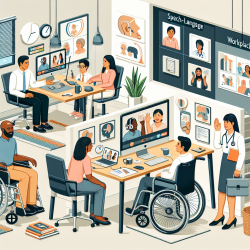Introduction
As a speech-language pathologist, creating inclusive environments is crucial for fostering effective communication and learning. Recent research, particularly the study "Disability-inclusive employment, cancer survivorship, and the Americans with Disabilities Act," provides valuable insights into how disability-inclusive employment practices can be integrated into our work, benefiting both practitioners and the children we serve.
Understanding Disability-Inclusive Employment
The Americans with Disabilities Act (ADA) plays a pivotal role in promoting disability-inclusive employment by requiring employers to make reasonable accommodations. This principle is essential for ensuring that individuals with disabilities, including cancer survivors, can participate fully in the workforce. The recent research highlights the importance of removing attitudinal and structural barriers to create an inclusive work environment.
Implications for Speech-Language Pathologists
For practitioners in speech-language pathology, understanding and implementing disability-inclusive employment practices can enhance service delivery. Here are some key takeaways:
- Accommodations: Ensure that your workplace is equipped to provide necessary accommodations for colleagues and clients with disabilities. This could include adaptive technology or flexible scheduling.
- Remote Work: The COVID-19 pandemic has shown the viability of remote work. Explore how teletherapy can be a permanent option for providing services to children, ensuring accessibility for all.
- Disclosure and Support: Create an environment where colleagues feel comfortable disclosing disabilities and requesting accommodations. This openness can lead to better support systems and improved outcomes for both staff and clients.
Encouraging Further Research
The research emphasizes the need for ongoing studies to better understand and implement disability-inclusive practices. As practitioners, staying informed about the latest research can help us adapt and improve our methods. Consider the following actions:
- Engage with professional organizations and attend workshops focused on disability inclusion.
- Collaborate with researchers to explore new ways to integrate inclusive practices into speech-language pathology.
- Advocate for policy changes that support inclusive employment and service delivery in educational settings.
Conclusion
Implementing disability-inclusive employment practices is not only a legal obligation but also a moral imperative that can significantly enhance the outcomes for children in speech-language pathology. By fostering an inclusive environment, we can ensure that all individuals, regardless of their disabilities, have equal opportunities to succeed.
To read the original research paper, please follow this link: Disability-inclusive employment, cancer survivorship, and the Americans with Disabilities Act.










